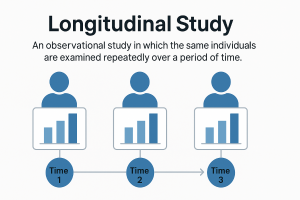The Brookbush Institute Publishes a NEW Glossary Term: 'Longitudinal Study'
The Brookbush Institute continues to enhance education with new articles, new courses, a modern glossary, an AI Tutor, and a client program generator.
“Longitudinal” refers to tracking subjects along the dimension of time.”
NEW YORK, NY, UNITED STATES, October 8, 2025 /EINPresswire.com/ -- - Excerpt from Glossary Term: Longitudinal Study— Dr. Brent Brookbush, CEO of Brookbush Institute
- Related Glossary Term: Evidence-Based Practice (EBP)
- Related Course: Acute Variables: Human Movement Specialist (HMS) Certification
DEFINITION
Longitudinal Study: A longitudinal study is an observational research design in which data are collected from the same individuals (or groups) repeatedly over a defined period of time. Unlike a cross-sectional study , which captures a single “snapshot,” a longitudinal study follows participants across multiple time points, enabling the analysis of changes, trends, and temporal relationships between variables.
SEMANTIC CLARIFICATION
- “Longitudinal” refers to tracking subjects along the dimension of time.
- “Observational” distinguishes these studies from experimental designs, as researchers observe natural variation rather than applying controlled interventions.
- “Repeated measures” emphasizes that the same participants are assessed at two or more time points.
APPLIED EXAMPLE
- Health Research: Measuring physical activity and cardiovascular health outcomes in the same cohort every 5 years for 20 years.
- Education Research: Tracking student test performance across multiple grade levels to evaluate long-term learning trends.
- Rehabilitation Science: Assessing recovery outcomes in post-stroke patients at 3, 6, and 12 months after discharge.
STRENGTHS AND LIMITATIONS
Strengths
- Allows investigation of temporal sequence, which may be supportive of causation.
- Useful for estimating incidence rates, not just prevalence.
- Enables identification of long-term trends and trajectories.
Limitations
- More resource-intensive and time-consuming than cross-sectional studies.
- Higher risk of attrition bias (participants dropping out).
- still observational, and cannot fully control for confounding variables or be considered strong evidence of causality.
FREQUENTLY ASKED QUESTIONS (FAQs)
- How is a longitudinal study different from a cross-sectional study?
Brent Brookbush
Brookbush Institute
+ +1 2012069665 ext.
email us here
Visit us on social media:
LinkedIn
Instagram
Facebook
YouTube
TikTok
X
Other
Legal Disclaimer:
EIN Presswire provides this news content "as is" without warranty of any kind. We do not accept any responsibility or liability for the accuracy, content, images, videos, licenses, completeness, legality, or reliability of the information contained in this article. If you have any complaints or copyright issues related to this article, kindly contact the author above.

